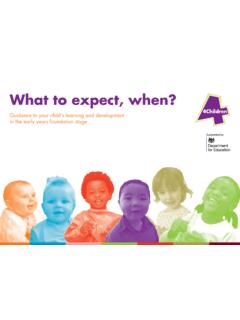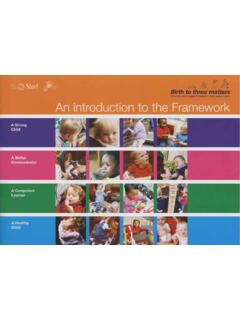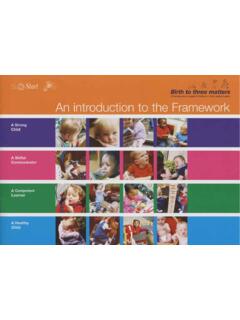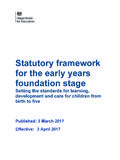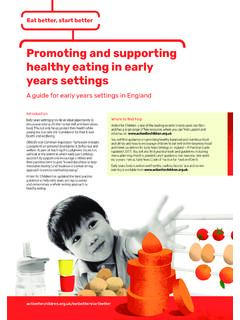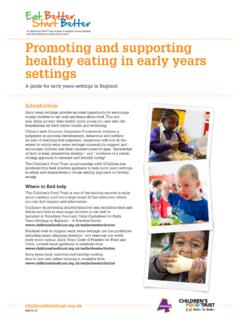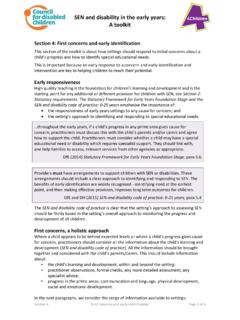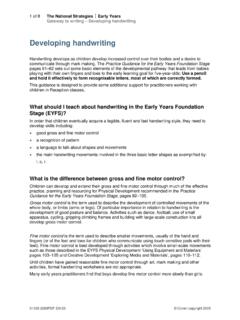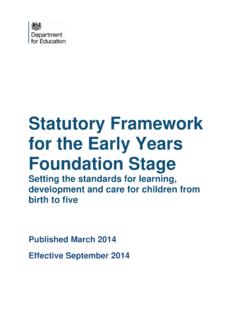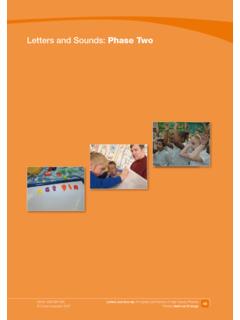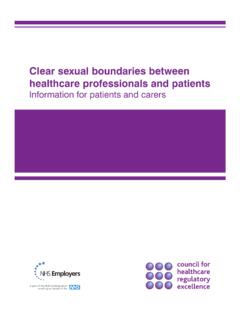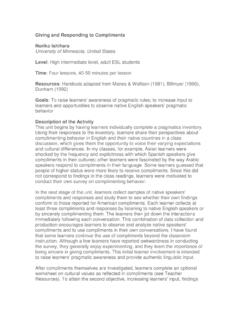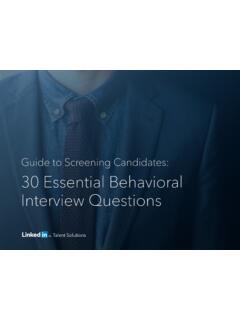Transcription of Guidance to your child’s learning and ... - Foundation Years
1 what to expect , when? Guidance to your child's learning and development in the early Years Foundation stage Supported by 1 | what to expect , when? - Guidance to your child's learning and development in the early Years Foundation stage 4 Children 2015. How to use this guide The Early Years Foundation Stage Framework (EYFS) sets out the learning and development stages for children as they grow from birth to five Years . For those working in the early Years - whether in a nursery, pre-school, a childminder or in a reception class in The 7 areas of learning are: school - the EYFS outlines what they need to do to support your child. The purpose of this booklet is to help you as a parent/carer* find out more about how your child is learning and developing Prime areas of learning particularly during their first five Years , in relation to the EYFS.
2 Children develop more rapidly during the first five Years of their lives than at important in the first 3 Years any other time. This booklet has been written to help you as a parent know what to expect during these vitally important Years by focusing on the seven areas of learning and development which are covered in the EYFS. Personal, Social and In this guide, your child's first five Years have been divided up into six age bands which overlap. This is because every child Emotional Development is different and children do not grow and develop at the same rate. It highlights what you might notice your child doing at these points. Children learn and develop through playing, exploring, being active, creative and being asked questions to help their thinking.
3 Physical Development After each age band we give you an example of some ideas and tips as to how you can help your child's learning and development. Page 34 details where you can find out more. As you know, being a parent is very special and amazing as you watch your child grow up. It can also have challenges. We Communication and hope this booklet will help you to know how your child is developing by highlighting what to expect , remembering that all children are different. Language One way of using this booklet could be to use it as a reference - see what you notice your child can do. Use it as a prompt to explore and try new things together. Specific areas of learning In using this booklet, if you feel unsure about your child's learning and development you might want to speak to someone from your local children's centre, your child's key person, a childminder or a health professional.
4 Literacy To find out more about the EYFS, please visit For information about free early education and entitlement for 2, 3 and 4 year olds visit Mathematics We thank the parents* who contributed to writing this booklet. This booklet is fantastic and will really help me know Understanding the World how well my child is developing and learning .. Expressive Arts and Design I have spent ages on Google trying to find out if Katie is where she should be this is great! . *At all points in this booklet when we refer to parents we include carers, family members and partners, of any gender. 2 | what to expect , when? - Guidance to your child's learning and development in the early Years Foundation stage 4 Children 2015.
5 what to expect , when? Guidance to your child's learning and development in the early Years Foundation stage Birth - 11 months 22 - 36 months Page 4 - 5 Page 16 - 17. what do you notice in your baby's early growing? what do you notice about your child as they start becoming Focus more on the prime areas of learning . more self confident and aware, and managing their feelings and behaviour? Focus on the prime areas of learning and give more attention to the specific areas. 8 - 20 months 30 - 50 months Page 8 - 9 Page 20 - 23. what do you notice as your baby starts rolling, touching what do you notice about your child as they grow in things and playing with toys? confidence? Focus more on the prime areas of learning .
6 Focus on the prime and specific areas of learning . 16 - 26 months 40 - 60 months Page 12 - 13 Page 26 - 31. Your child might be going to a nursery or childminder. Discuss In this age band we list early learning goals which are the what you are noticing with them. expectation for where children may have reached at the end Focus more on the prime areas of learning . of reception year at school. Focus on the prime and specific areas of learning . In this booklet your child's first five Years are divided up into the six age bands After each age band we give you some ideas and tips as to how you can help above to highlight what you might notice your child doing at these points. your child's learning and development.
7 Page 34 details where you can find out Please remember: every child is different! Children do not grow and develop at more. the same rate. 3 | what to expect , when? - Guidance to your child's learning and development in the early Years Foundation stage 4 Children 2015. Birth -11 months: You might notice Personal, Social and Emotional Development Physical Development Communication and Language Making relationships Moving and handling Listening and attention I like to be with other babies and grown ups. I look at faces I move my head or body when I hear noises and see things I move my head or body to find sounds that I know when I. and move my arms and legs to show that I like to be with them. or people. hear them.
8 I look at faces and can copy movements you make with your I can hold my head up. I listen to different sounds grown ups make with their voices face, like sticking out my tongue, opening and closing my I can move my arms and legs in different ways such as and can move my arms, legs or body or make noises when mouth or making my eyes bigger. waving and kicking. I hear them. I can show you that I like you talking to me by moving my arms I can roll over from my back on to my tummy and from my I will show you that I like you talking to me by smiling at and legs, making my eyes bigger and opening and closing my tummy on to my back. you, looking at you or moving my arms, legs or body. mouth. Sometimes when you talk to me I will become quieter or When I am lying on my tummy I can use my arms to help I can show you that I am interested in what you are doing by me lift my head and then my chest.
9 Make noises and move my arms, legs or body. looking at and watching you. When you talk to me, I look at you, but I will turn my head I like to look at and play with my hands and feet. I can show that I like you to hold me or cuddle me by snuggling or body when you stop. I can reach out and touch things that are near to me. up to you, smiling, looking at your face or stroking you. I like listening to sounds that things I know and grown ups I can hold things in my hand that are near to me. make. Self confidence and self awareness I like to explore things by putting them in my mouth. I listen when you sing songs and rhymes as you tickle my I laugh and gurgle to tell you that I like being tickled or lifted tummy or play with my fingers and toes.
10 Up. Health and self care I stop what I am doing and listen to a new voice or sound I can use my voice or look at you to get your attention and tell I like it when you cuddle me, stroke my cheeks or pat my when I hear it. you that I want you to be with me. back. I will show you that I am upset, tired or hungry by making Understanding Managing feelings and behaviour noises such as crying or by moving my arms, legs or body. When you say my name I stop what I am doing and look I like to see grown ups' faces and hear their voices when I am I will show you that I know when it is meal time by looking at you. feeling upset, worried, tired or hungry. at you, my food or drink or by making noises or moving my I understand what you mean when you use words and I snuggle into grown ups that I know when I am feeling upset, arms and legs to tell you that I am excited or ready.
